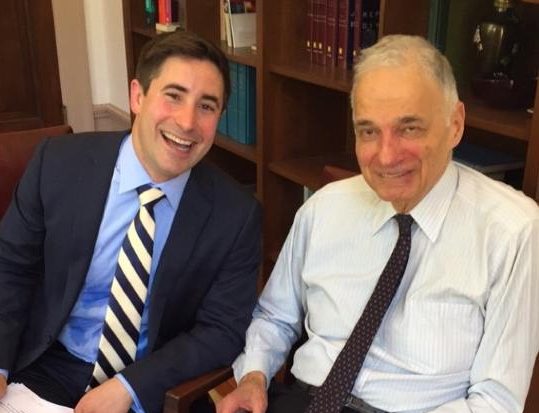How The Hill and its editor helped launch my American journalism career
This is one in a series of op-eds celebrating The Hill’s 30th anniversary.
February 2015: My time in America was coming to an end; I was sure of it. My one-year visa would soon expire, my fellowship would soon end, and I would soon be back on a plane to Australia to resume my career covering federal politics for my hometown paper, The Sydney Morning Herald.
But America had gotten under my skin. Since I had touched down in Washington in the summer of 2014, I had spent countless hours working my way down a spreadsheet. I had drawn up a list of U.S. media outlets where I hoped to convince somebody to give me a job. That list contained pretty much every publication covering politics in America.

I knew almost no one here when I arrived, and precisely nobody in the American media. And so I cold-called and cold-emailed my way down the list. I received one rejection after another. No one wanted to hire me, and I couldn’t blame them. The clips I sent around covered Australian political events that would have been obscure in Washington. To make matters worse, every political source I had lived more than 20 hours away on an airplane.
Then, finally, a breakthrough. I had been introduced to the journalist, Sue Davis, then with USA Today, who suggested I reach out to The Hill’s editor-in-chief, Bob Cusack. Sue was kind enough to let me drop her name, so I brandished it shamelessly in the subject line of my email to Bob.
I wrote to him on the morning of Sunday, Feb. 8, 2015, asking if he would be willing to meet me for coffee. Seven hours later, Bob replied that yes, he’d take the time to meet with me.
At least a couple of times since then, I have thanked Bob for taking a chance on me. But I doubt I have been able to convey to him adequately what his intervention meant for my life. He, more than any other person, is responsible for my start in American journalism.
I began work at The Hill in summer 2015, shortly after a billionaire named Donald Trump rode down a golden escalator and began his run for president. Bob was an ever-present spur, a cheerleader and an always-constructive critic. He pushed me to dig deep into the Republican donor communities that gave me my first glimpses into the back rooms of American politics.
The thing I appreciated most was his patience. It is hard to overstate how much of a knowledge deficit I had to make up. I was thrown into a presidential race as a newly-arrived immigrant. Everything I was covering was new. I had no sources and only passing familiarity with the American system. Everything I knew consisted of book knowledge and what I had absorbed during my fellowship with the American Political Science Association.
For the next year and a half, I worked like a maniac. I had no life outside work, but I felt like I was so far behind my competitors I would almost have to kill myself just to catch up. Along the way, Bob gave me confidence that I could do it. He ran a fast, energetic newsroom that had to punch above its weight with limited resources. But when I thought it was necessary to travel for a story, Bob invariably encouraged the idea.
Bob had decided it was worth it to give me a go. And he kept the faith as I struggled to prove him right. For that, I will always be indebted to him, and to the publication to which he has dedicated so much of his life.
Long live The Hill!
Jonathan Swan covered the 2016 presidential campaign for The Hill. He now covers the 2024 presidential campaign for The New York Times.
Copyright 2024 Nexstar Media Inc. All rights reserved. This material may not be published, broadcast, rewritten, or redistributed..










